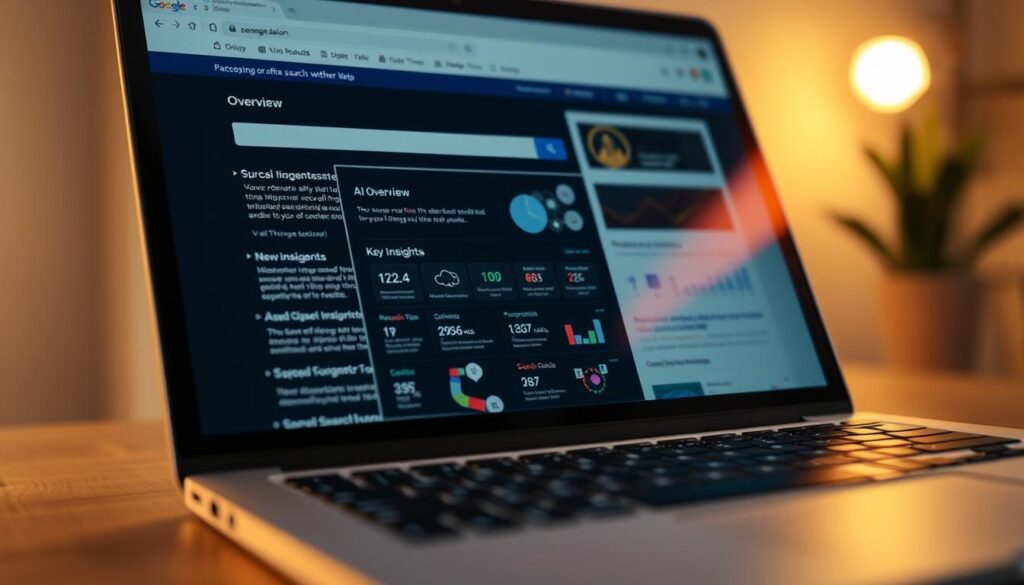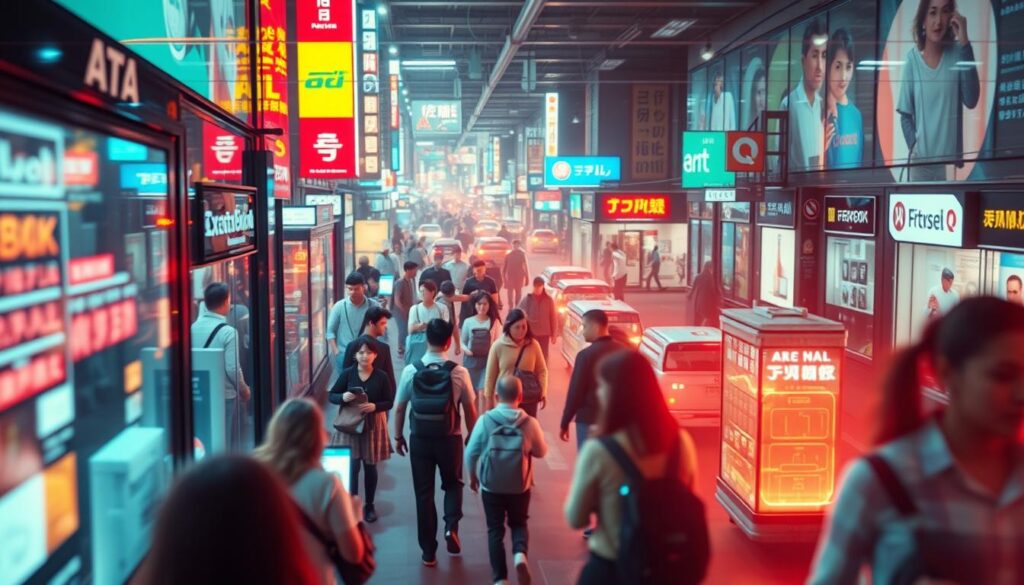Artificial intelligence (AI) is changing digital marketing, sparking debate among experts. Some see AI as a game-changer for SEO, while others worry it could upset the status quo. The rise of AI in search results is altering how we interact with the web, leading to a deeper look at its effects on traffic.
This analysis aims to shed light on the impact of AI on SEO for businesses. It helps them understand the shift and how to adapt their online presence. For more on AI tools and their role in marketing, check out this guide.
Key Takeaways
- AI is significantly influencing digital marketing strategies.
- Concerns about the AI impact on organic traffic drop are prevalent.
- AI overviews in search results are affecting user behavior and engagement.
- SEO updates are necessary to adapt to these emerging trends.
- Gardnering insights from AI can enhance content strategies.
Understanding AI’s Role in Modern SEO

AI has changed how marketers use SEO. Search engines now give personalized results based on what users want and do. This shows how important it is to know how AI affects algorithms.
Generative AI helps search engines understand a lot of data quickly. This makes it key for marketers to focus on what users need. As AI gets better, using modern search strategies is vital for SEO success.
Experts say we need to be ready for AI’s new abilities. Better search results make online interactions better for businesses. Keeping up with AI in SEO is crucial to stay ahead.
The Rise of AI Overviews in Search Results

AI overviews are changing how we see search engine results, especially for questions. Google and others have started using these summaries. They help users quickly get the main points they need.
Since May 2024, more searches include these AI summaries. This change affects how people use the internet. Now, they often don’t need to visit websites for answers.
About 88% of searches are looking for information. AI overviews are making a big difference here. Websites might need to change how they work to keep up.
These overviews also change how we interact with search engines. The data shows ups and downs in AI content use. Businesses need to understand these changes to stay ahead. For more on this, check out this link.
AI Impact on Organic Traffic Drop

Artificial intelligence has changed how search engines work, affecting organic traffic. Studies show a worrying trend: up to 30% drop in traffic for some brands. This is especially true for those focused on informational searches. It’s key to understand search intent to tackle these changes.
Early Studies Indicating Traffic Declines
Research shows AI in search engines leads to big drops in organic traffic. This is a big problem for brands that rely on old search optimization methods. AI tools now focus on quick answers, making it hard for sites with detailed info to attract visitors.
This highlights AI’s role in changing how we search and behave online.
The Importance of Informational Intent Queries
Brands that focus on informational searches, like education sites, have seen big drops. For example, Chegg’s reliance on informative content has made it less visible as AI answers dominate. It’s crucial to understand what users want in their searches.
Looking at traffic data can help find ways to adapt content strategies. For more on AI’s impact, check out this link: AI Transportation Insights.
The Great Decoupling: Clicks vs. Impressions

The Great Decoupling shows a big change in how people interact with search results. Before, more impressions meant more clicks. But now, with AI in search, this link is not as clear. This makes us wonder how to understand search performance metrics.
What Is the Great Decoupling?
The Great Decoupling means more impressions don’t always mean more clicks. AI tools in search results are changing how we look at websites. Now, users might choose AI summaries over visiting websites. This change makes it key for marketers to rethink their strategies.
Data on Impressions and Clicks
New data shows a gap between impressions and clicks. Websites see more impressions but get fewer clicks. This shows that while content is seen more, people are engaging less. Marketers need to adjust their goals in this new world.
Changes in User Behavior Due to AI Features

AI features have changed how we use digital tools every day. People now use AI chat interfaces more for getting answers. This shows a big change in how we interact with information.
Before, we used search engines to find what we needed. But now, AI tools give us quick answers. This makes us less likely to search online the old way.
User Preferences: Chat AIs vs. Traditional Search Engines
More people prefer AI chat interfaces over search engines. They want fast, direct answers to their questions. Search engines, while still useful, are losing popularity.
This shift shows a big change in how we get information. It might also change how companies market online.
Effects on Referral Traffic
The move to AI tools affects how we find new websites. With AI, we click less on links to other sites. This means marketing strategies need to change.
It’s important to understand these changes. This way, we can find new ways to reach people and avoid losing traffic.
Challenges in Measuring AI’s Impact

The fast growth of AI brings big traffic measurement challenges for digital marketers. It’s hard to see how AI affects organic traffic because of the mix of old metrics and new AI tools. Google Analytics now mixes data from AI and regular traffic, making it tough to understand where traffic comes from.
AI’s way of showing search results can lead to different types of traffic data. This makes it tricky to see how AI search metrics really affect website visits. Marketers face a big task in figuring out these changes, especially with tools like Google Analytics that might not show all the changes in user behavior caused by AI.
Identifying the Sources of Traffic Loss

Understanding where traffic loss comes from is key in today’s digital world. AI in search engines makes it harder to track traffic sources. Tools like Google Analytics and Google Search Console (GSC) help us see how users behave and where they come from.
Utilizing Google Analytics and GSC
Google Analytics and GSC are vital for tracking traffic changes. They help separate organic traffic from AI-driven interactions. This lets marketers see which content types their audience prefers.
By using these tools, marketers can create a SEO strategy that works well with AI. This is important for keeping up with AI’s growing role in search.
Separating Traditional and AI-Driven Traffic
Knowing the difference between traditional and AI-driven traffic is crucial. Analytics help businesses find out which sources lead to more engagement and sales. This knowledge is key for making content that resonates with audiences.
Tools like Google Analytics help identify traffic sources. This allows for a targeted approach to dealing with AI’s impact. It’s essential for staying relevant in a changing digital landscape.
Strategies to Mitigate the Impact on Organic Traffic

The world of digital marketing is changing fast with AI. It’s key to make smart moves to keep organic traffic up. SEO changes are a must to keep up with new algorithms and user habits. Marketers should focus on quality content and stay current with trends.
Techniques for Adjusting SEO Strategy
It’s time to look at SEO again to boost organic traffic. Start by improving keyword research to match what people are searching for. Use AI tools to understand your audience better and create content they’ll love. Some important steps include:
- Using analytics to find top keywords
- Refreshing old content to make it more relevant
- Adding structured data to get more visibility
The Role of Quality Content
Quality content is more important than ever. It keeps users engaged and builds trust. A good content plan focuses on being deep and relevant. This helps a lot in getting more organic traffic. Here’s how:
- Write detailed articles with real insights
- Use different formats like videos and infographics to connect with people
- Keep your content fresh with the latest news and trends
For more tips on improving your digital marketing, check out AI tools that can help make your content better.
Optimizing for AI: An Updated Approach to SEO
Search engine optimization is changing fast, thanks to AI. Marketers need to update their strategies to use AI well. Keeping up with technical SEO is key to a strong web presence. This helps companies shine in an AI world.
Stay True to Technical SEO Practices
Technical SEO is the core of good digital marketing. Focus on site speed, mobile-friendliness, and structured data to improve user experience and rankings. Investing in these areas helps companies handle AI better. It makes AI optimization easier and boosts visibility.
Web Presence Optimization Overview
Brands need a full plan for their web presence in an AI world. Use AI tools to understand user behavior and target better. Keep content fresh and engaging to meet user needs. For more on AI tools, check out this guide. A strong web presence with quality content and technical skills helps companies stay ahead of AI changes.
The Future of AI in Digital Marketing
The world of AI in digital marketing is always changing. Businesses need to keep up with these changes. Understanding how AI changes SEO is key.
Experts say AI tools help make better decisions and improve customer interaction. This means being adaptable and agile is crucial for success.
AI analytics give marketers a deeper look into what customers want. This leads to more personalized experiences and better sales. Businesses must get ready to use advanced AI tools to stay ahead.
They need to weigh the benefits against the risks. Keeping up with new AI developments is important.
Using insights from top experts can give companies an edge. By knowing what customers and search engines want, brands can make smart moves. Marketers who use AI well will likely stay ahead of the competition.
Conclusion
The mix of AI and organic traffic is getting more complex. This means we need to rethink old SEO strategies. The growth of AI brings both challenges and chances. Digital marketing insights show that we must be ready to use new tech to stay seen and engaged.
Marketers should keep up with changes in their fields. By using AI and sticking to traditional SEO, businesses can improve their plans. This balance helps deal with changes in organic traffic and opens up new ways to grow.
Keeping up and adapting is key in this fast world. AI is changing how we talk to customers. To stay ahead, we need to learn and use the newest methods. This way, we can make the most of our online space.







